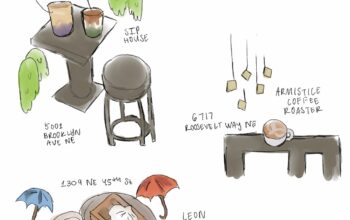Flexible late work policies fit the diverse needs of students, teach valuable lessons about communication.

There can be any number of reasons why an assignment was turned in late. I’ve submitted assignments late because of missing important notes, a busy schedule, or (regrettably) not wanting to do the assignment. However, it depends on the teacher how that late work is graded.
Roosevelt High School language arts teacher Amy Noji described the Language Arts Department policy: “Students who turn [small assignments] in late cannot get higher than a B minus or an 80%. … After two weeks they can’t submit the assignment because the point of the learning is done.” Larger assignments, Noji said, can be turned in beyond two weeks, otherwise, “The grade won’t be able to recover.”
Roosevelt language arts teacher Janith Pewitt said the goal of the two-week limit on small assignments is to keep students’ late work from piling up. She’s noticed that some students “get so troubled by what they missed that then everything starts to cascade.”
Both teachers give extensions on late work as well. Noji reasons that, “As long [as the student is] communicating, I will be flexible. … Not everybody writes at the same pace.” She uses an application called Remind to encourage students to communicate with her.
As a student, I believe that a grade should be solely based on the quality of the work that was completed. The goal of an assignment should be understanding the material, regardless of how long it takes.
Despite this, some argue that giving late work full credit is unfair to students who complete their work on time. If they did the work in the time frame given, shouldn’t they receive some benefit for it?
The short answer is no. Turning work in on time is important, but requiring the same deadline for all students is outdated. Every person learns and understands material differently. Punishing students for turning something in late, regardless of the reason, only discourages those students from working harder on the next assignment.
If I were to teach a course of my own, late work would receive no more than an 80%, and could be turned in up to the semester end. Extensions would be easy to receive; If a student needed extra time, all they had to do was let me know before the deadline.
This late policy is a compromise between a policy that pushes students to get the assignment done, and a flexible policy that fits the needs of each student. Throughout the rest of school and into holding a job, being able to communicate your needs is a valuable skill to have.
Late policies have the ability to teach students valuable lessons like communication and time management.
Follow The Roosevelt News on Instagram @therhsnews. Questions, comments, or concerns? Contact the Editorial Board at therooseveltnews@gmail.com.
Your voice matters. Share your thoughts and experiences in the comment box below.



